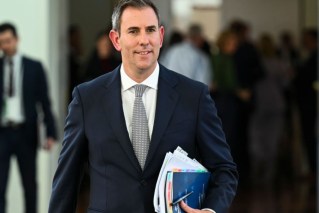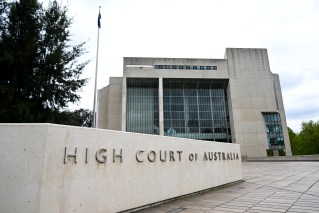Preventative detention laws pass parliament
Recently freed immigration detainees will soon be subject to similar measures as high-risk terrorists after preventative detention laws passed parliament.
The House of Representatives on Wednesday night voted 68 to 59 in favour of the laws, which will deal with freed detainees who pose an unacceptable risk of committing a serious violent or sexual offence.
The laws were put in place after the High Court ruled that indefinite immigration detention was invalid, resulting in almost 150 detainees being released.
Under the laws, released detainees assessed by a court to pose an unacceptable risk would be put back behind bars.
The maximum length of the detention order is three years but would be reviewed annually.
Immigration Minister Andrew Giles said the detention measures were necessary.
“This is the reality of the High Court’s decision,” he told parliament.
“The government did not choose to be in this position.
“The situation was imposed on this parliament by the High Court.
“The preventative detention regime would allow for the court to detain the worst of the worst offenders.
“To be clear, it would not count all of the detainees released since the High Court decision.”
A fourth man recently freed from detention was arrested on Wednesday after a 45-year-old allegedly broke the curfew of his visa conditions and stole luggage from Melbourne airport.
Of the almost 150 detainees freed after the High Court ruling, four have allegedly reoffended.
Two of these are registered sex offenders.
Emran Dad, 33, faced court on Tuesday charged with breaching his reporting obligations to police after he allegedly contacted a child and did not disclose social media accounts.
The heads of the Australian Border Force and the Australian Federal Police on Wednesday briefed Prime Minister Anthony Albanese and premiers on Operation Aegis, the joint operation to ensure community safety following the High Court decision.
Giles has also contacted state and territory ministers to ensure preparations to help keep the community safe are under way.
Court applications had been drafted in anticipation of the laws passing.
Layers of protection were being imposed to ensure Australians’ safety, Home Affairs Minister Clare O’Neil said.
The laws would be able to withstand a High Court challenge after previous ones were struck out, she said.
“The safety of the Australian community is paramount to us,” she said.
Neither minister confirmed how many people would be covered by the laws nor how many applications were in the works.
The reason the timing and number of detention orders were not being released was due to the risk cases could be prejudiced, Foreign Minister Penny Wong told parliament.
The detainees’ offences also remain secret, despite Giles previously telling parliament there were three murderers and several sex offenders among the cohort.
The opposition has chastised the government for not having legislation ready to implement as soon as the court’s decision was handed down so offenders weren’t released.
“They said we didn’t need a preventative detention regime or that we couldn’t have a preventative detention regime,” Deputy Liberal leader Sussan Ley said.
“The next thing the Home Affairs Minister said was parliament won’t leave until we have such a regime.
“How could that possibly inspire confidence in people about community safety?”
But Attorney-General Mark Dreyfus slammed the Coalition for not understanding how High Court judgements work.
The government could not out-legislate the constitution, Dreyfus said.
Any delay could expose the Commonwealth and individual public servants to legal action and damages, he said.
“The decision of the High Court sets a new limit on the power to detain anyone in the same position as the plaintiff in that case and it had to be implemented immediately,” he said.
Greens leader Adam Bandt said the debate on the laws was a race to the bottom as while “some of [the freed detainees] have committed heinous crimes, many of them haven’t”.
1800 RESPECT 1800 737 732
National Sexual Abuse and Redress Support Service 1800 211 028
Lifeline 131 114
Kids Helpline 1800 55 1800 (for people aged 5 to 25)
-AAP








